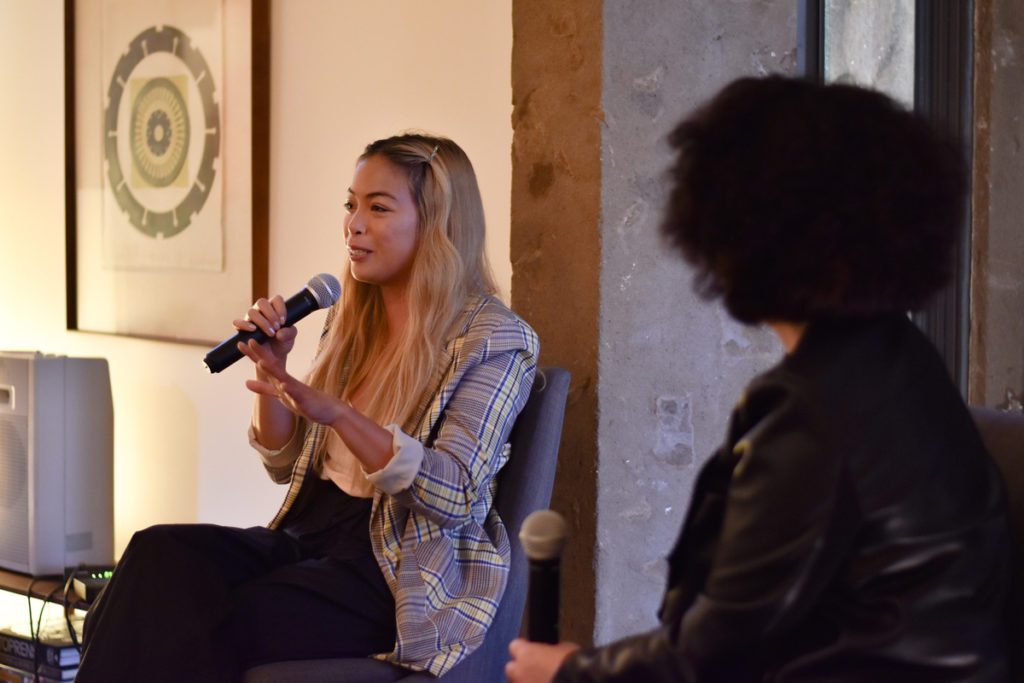
Karen Lin, Senior Photographer
Modern society has left the “girlboss era,” Jia Tolentino argues. It has opted instead for an anti-work, “Celestial Seasonings Sleepytime bear era.”
Tolentino, a staff writer for The New Yorker and the author of the New York Times bestselling essay collection “Trick Mirror,” spoke at an Ezra Stiles College tea on Wednesday afternoon. The conversation, sponsored by the Poynter Fellowship in Journalism, explored the sacredness of abortion, feminism’s place in modern culture and how much power the individual has to affect political issues.
“How do you reconcile the fact that on so many of the things that are most important, individual action can often seem objectively, in a utilitarian sense, meaningless and that collective action is the only thing that matters?” Tolentino said. “The question that I got so much after my book came out was like, okay, what should we do? I don’t know … I’ve been trying to let uncertainty be galvanizing rather than comforting.”
Discussing celebrity culture, Tolentino said that the “most profitable new idea on Earth” is the delineation of human identity as a commodity. However, Tolentino said she feels the most free not when she exercises the “cold power” of the individual, but when the boundaries dividing her from others dissolve.
Tolentino also brought society’s “inescapable obsession” with the celebrity into the political sphere. Although she believes that the most important feminist forces are frontline labor workers like those in the National Domestic Workers Alliance and the United Farm Workers, she finds it difficult to write popular stories without a central protagonist.

“How do you tilt the gale force enthusiasm and not marketability, but the money that only tends to coalesce around the exemplary figure?” Tolentino said. “How can you do that around [feminism], an ideology that only makes sense if it is anti-exemplary figures? … [Frontline labor work] has always felt like the most vital feminist work to me, but I don’t think I’ve never figured out a way about to write a blog post about it that will get 5,000 people to read it.”
Saenah Boch ’23, who attended the tea, said she found Tolentino’s stance against celebrity iconography somewhat ironic given her “cult following.”
Following the 2019 high-profile success of “Trick Mirror,” Tolentino shared that she thought the idea of celebrity was “bafflingly strange.” Although very grateful, the amount of public praise for her book left her feeling “skinned.”
In response to the public attention, the COVID-19 pandemic and the birth of her daughter, Tolentino lowered both her profile, and the volume of non-fiction she was producing for the New Yorker. She began screenwriting and undertook the personal mission of not writing anything with the word “I” in it for a full year.
Tolentino also discussed her Filipino heritage and the birth of her daughter in 2020. Living far from her parents, Tolentino said that during the pandemic she harbored “incredible sorrow” that her daughter would not be surrounded by others speaking Tagalog frequently.
Following a trip to the Philippines with her daughter to visit family, Tolentino said she revised her concerns.
“[My Filipino identity] is a relationship that is elastic, forgiving, expansive, and can be made and remade in so many different ways,” Tolentino said. “[My daughter] can still be Filipino. She and I don’t speak Tagalog, and she won’t even understand it like I can, but she can make of this ancestry [what she wants] and she doesn’t have to lose it.”
Resty Fufunan ’24, Co-President of the Yale Filipinx Club, pointed out that the tea took place during Filipino American History Month. For Fufunan, Tolentino is part of that cultural legacy and is an “icon for the Filipino diaspora.”
Fufunan said that it “meant a lot” for Tolentino to talk about her Filipino identity at the Tea.
“I got to frame a lot of her responses within her family, within her cultural legacy,” Fufunan said. “Something that I’m still really thinking about is the fact that she referred to her relationship with her Filipino identity as elastic. I think that gave me something to think about as I continue to interrogate my own identity.”
Tolentino also discussed the incongruity of her immigrant parents’ desire for upward mobility with her own worldview. Attending what her parents considered the “best school possible” while on scholarship for most of her life, Tolentino said although she did find success, she believes attending these institutions damaged her “moral sensibilities.”
While pushing against her parents’ values leaves her feeling guilty because of their sacrifices, Tolentino hopes to send her daughter to their local public school.
Tolentino said she believes many Yalies may be in a similar position to her as a student, explaining that she hoped to provide stability for her parents by attending elite institutions. Addressing students who are struggling with the tension between upward mobility and pursuing what inspires them creatively, Tolentino encouraged students to strike a balance between the two extremes.
“I don’t think you have to choose between I’m going to go straight out of school to the most high paying Goldman job I can get, or I’m going to write poetry and live on $10,000 a year,” Tolentino said in an interview with the News. “There are a lot of spaces in between where you can figure out how to do what, what drives you creatively and ethically and politically as a person in the world.”
Head of College Alicia Schmidt Camacho, who moderated the tea, expressed gratitude to the Poynter Fellowship for sponsoring Tolentino’s visit. For Camacho, the Fellowship, which brings journalists to Yale, allows the University community to explore issues beyond a strictly academic context.
“Jia Tolentino has stood out to me for many years just personally as an extraordinary writer who’s really able to capture what is most urgent and to help us understand the cultural politics of this moment,” Camacho said in an interview with the News. “But I also had the sense that she would connect really well with students. In some ways, she’s able to articulate the needs and concerns that students are thinking about.”
Karsten Rynearson ’26 said that the conversation of how feminism is expressed culturally post “girlboss era” continues to linger in his mind. As a longtime fan of Tolentino’s essays, the event surpassed all of Rynearson’s expectations.
“I’ve been reading [her] essays since quarantine and they were such a formative part of my life at that point, so to see this happen was absolutely incredible,” Rynearson said. “[Tolentino] was just such an incredibly wise, thoughtful presence and I feel more expansive in my lines of thinking after seeing this.”
The tea was co-sponsored by the Yale Center for the Study of Race, Indigeneity and Transnational Migration.
![]()







